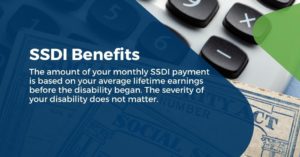Social Security Disability Insurance (SSDI) is a federal insurance program under which workers earn coverage for benefits by paying Social Security taxes on their work earnings. The program benefits disabled workers and their dependents, replacing some of their lost income when they cannot work.
To receive benefits, a person must meet the definition of disability under the Social Security Act. They cannot work due to a severe medical condition that has lasted or is expected to last at least one year or result in death. The person’s medical condition must prevent them from doing work they did in the past. It must also prevent them from adjusting to other work.
A disability can happen at any age, so even younger people can receive benefits if they qualify. Approximately 9 million people get SSDI, just a small subset of Americans living with disabilities.
How Much Will I Receive?
 The amount of SSDI you receive each month is based on your average lifetime earnings before your disability began. Your SSDI benefit amount is not based on the severity of the disability. You cannot be denied SSDI because you have too much unearned income or too many assets.
The amount of SSDI you receive each month is based on your average lifetime earnings before your disability began. Your SSDI benefit amount is not based on the severity of the disability. You cannot be denied SSDI because you have too much unearned income or too many assets.
Your past earnings must be covered under the Social Security program to count toward your SSDI benefits. Covered earnings are wages you received from jobs that are paid into Social Security. If your paychecks showed money withheld for Social Security taxes or Federal Insurance Contributions Act (FICA) tax, the wages you made at that job are covered earnings and will count toward calculating your benefit amount.
Your SSDI payment will be based on your average covered earnings over years, known as your average indexed monthly earnings (AIME). A formula is then applied to your AIME to calculate your primary insurance amount (PIA). You can find your covered earnings history on your annual Social Security statement.
Possible Reductions in Disability Payments
Your SSDI benefits might be reduced if you receive other public disability benefits, including but not limited to:
- Workers’ Compensation.
- Longshore and Harbor Workers’ Compensation.
- Civil Service disability pensions.
- Black lung benefits.
- Federal employee retirement benefits.
- Disability insurance benefits from state or local governments.
VA benefits will not reduce your benefit or private pensions or private insurance.
The combined total amounts you receive from SSDI and all other public disability benefits cannot exceed 80 percent of your average pre-disability earnings. If the amount is more than 80 percent, the excess is deducted from your SSDI benefits. The excess amount is deducted from your other public benefit in some states.
If you qualify for more than one public disability benefit, you may want to speak with a lawyer to ensure you do not miss out on any entitled benefits.
SSDI payments range on average between $800 and $3,345 per month, and there is a maximum monthly benefit that changes annually. The Social Security Administration (SSA) has an online benefits calculator that you can use to estimate your monthly benefits.
When Do SSDI Benefit Payments Begin?
Under the law, your payments cannot begin until you have been disabled for five months. Payments will usually start with your sixth month of disability. There is no waiting period if your disability is because of amyotrophic lateral sclerosis (ALS) and you are approved for SSDI on or after July 23, 2020.
If you are approved for benefits, the notice you receive from the SSA will tell you when your payments start.
How Long Do SSDI Benefits Last?
SSDI benefits are not necessarily permanent. There are three scenarios under which benefits stop:
-
- When you are no longer disabled. If your condition changes such that your disability is no longer considered to be severe or debilitating enough to preclude you from working, your benefits will end.
- When you reach retirement age. When you reach 65 years old, your SSDI benefits will automatically convert to Social Security Retirement benefits. The amount of money you receive each month generally remains the same.
- When you earn too much money. There are limits on the amount of income you can earn when receiving SSDI.
The law requires the SSA to perform a continuing disability review (CDR) at least once every three years to determine if you still have the disability. This CDR is waived if it is determined that your medical condition will never improve, such as amputation or permanent blindness. The SSA may still review your case once every five to seven years in those cases.
Can I Receive Retroactive Payments?
Once the SSA approves your SSDI application and calculates your monthly benefit, you may be entitled to back pay. The amount depends on the date you applied for benefits and when your disability began.
Philadelphia Social Security Disability Lawyers at Galfand Berger LLP Help Disabled Individuals Obtain SSDI Benefits
Applying for SSDI benefits is complicated, requiring applicants to submit extensive proof of work history and employment dates. Most applicants are initially denied benefits, often owing to technical reasons that have nothing to do with their medical condition. Our Philadelphia Social Security Disability lawyers at Galfand Berger LLP help those with disabilities obtain SSDI benefits. Call us at 800-222-USWA (8792) or contact us online to schedule a free consultation. From our offices in Philadelphia, Bethlehem, Lancaster, and Reading, Pennsylvania, we proudly serve clients across Pennsylvania and New Jersey, including Allentown and Harrisburg.
 Google Screened
Google Screened
